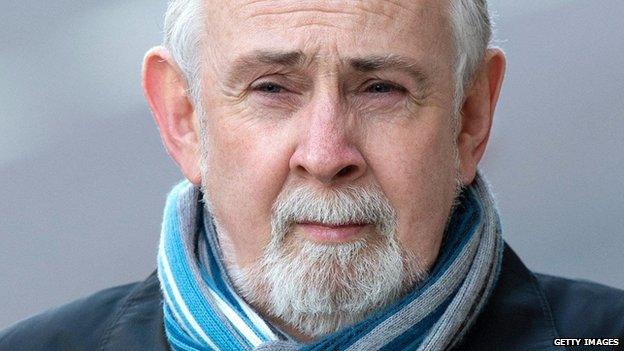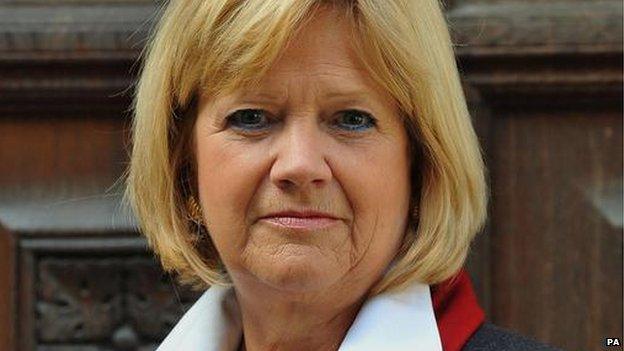On the Runs scheme 'not amnesty and lawful' says judge
- Published

John Downey received an assurance he would not face prosecution
Letters issued to republican terrorism suspects - so-called On the Runs - were not an amnesty and the scheme was lawful, a judge has found.
Lady Justice Hallett's review, external, ordered by PM David Cameron, found "significant systemic failures" in how it operated.
The scheme was made public when the trial collapsed of a man suspected of the 1982 IRA Hyde Park bombing.
John Downey was wrongly told he was not wanted by any UK police force. However, he was still being sought by the Met.
Northern Ireland Secretary Theresa Villiers: "Suspected terrorists were not handed a get out of jail free card"
Lady Justice Hallett said the letter to him was the result of a "catastrophic mistake" by police in Northern Ireland.
The police had realised they had made a mistake, but the assurance to the County Donegal man was never withdrawn.
"Nothing in law or logic" explained their failure to rectify the error, Lady Justice Hallett said.
Chris Daly, whose brother Lieutenant Anthony Daly was killed in the Hyde Park bomb, said the review went a "long way in answering a lot of the questions that were raised when the John Downey case was thrown out of the Old Bailey".
"I think the report itself is very objective and Lady Justice Hallett has delivered on what she promised when she personally met the families a few months back," he said.
Shelly Gilfillan's uncle Lexie Cummings was murdered by the IRA in Strabane in 1982. A man suspected of involvement received one of the letters saying he was not wanted by the authorities.
"No-one seems to know what will happen next," she said. "The letters should be rescinded."
Lady Justice Hallett's report found the administrative scheme was kept 'below the radar' due to its political sensitivity, but said it would be wrong to characterise the scheme as "secret".
She added: "If there was a lack of clarity and openness, responsibility lies with the UK government."
There was enough information in the public domain for anyone keeping a close eye on Northern Ireland affairs to have known there was such as scheme, she said.
The judge said she had "detected no sinister motive in the failure to notify the minister for justice, the first minister and the Policing Board of the scheme".
"The hope seems to have been that the scheme could be brought quietly to a close without generating the kind of controversy we have seen in recent months.
"Whether that was a wise policy is for others to decide."
The report, published on Thursday, also found that letters were issued in error to two other republican terror suspects.
Lady Justice Hallett also found:
The scheme was not designed, but evolved, which meant there was no overall policy nor responsibility and accountability for it
It lacked proper lines of responsibility, accountability and safeguards
When errors came to light, opportunities were missed to rectify them
The terms of reference of Lady Justice Hallett's review were to produce a full public account of the operation and extent of the scheme, and to determine whether any letters contained errors.
The judge did not have the power to compel witnesses to give evidence.
Northern Ireland First Minister Peter Robinson said: "This scheme was wrong in principle and shambolic in practice. There were a series of errors that need to be rectified.
"At the heart of the issue is what happens next?"
Northern Ireland first minister Peter Robinson: Report "a goldmine of information"
The Northern Ireland Good Friday Agreement of 1998 meant anyone convicted of paramilitary crimes was eligible for early release from prison.
However, this did not cover those suspected of such crimes, nor did it cover people who had been charged or convicted, but who had escaped from prison.
Sinn Féin sought a scheme that would allow escaped prisoners and those who were concerned they might be arrested to return to the UK, but a formal legal solution proved difficult to establish in the face of strong unionist opposition.

Lady Justice Hallett was appointed to look at the scheme dealing with On the Run paramilitary suspects
In addition to the Hallett Review, MPs at Westminster's Northern Ireland Affairs Select Committee have been holding public evidence sessions to look at the scheme.
Witnesses who have appeared before the committee include former Northern Ireland secretaries Peter Hain and Paul Murphy, current and former senior police officers, former detectives involved in administering the scheme and relatives of victims of the Troubles.
Separately, police in Northern Ireland are reviewing the process that led to the issuing of the letters.
Police Service of Northern Ireland chief constable George Hamilton said on Thursday: "I want to reiterate PSNI's apology for the additional pain the families have had to endure as a result the failure to secure justice for their loved ones."
He added: "Police have an ongoing responsibility to review evidence, and as is always the case, where new evidence exists, we will investigate and present the information to the prosecuting authorities.
"This specific piece of review work is both time and resource intensive and will be conducted diligently over the coming years."
Meanwhile, the Irish Department of Foreign Affairs has confirmed it put forward the names of two men to British authorities to be considered for the scheme.
In a statement to RTÉ, a spokesperson for the department said it acted "as a conduit for two individual cases" after representations had been made in 2002.